Video: United Way Day of Caring in Batavia
Thursday was United Way's annual Day of Caring, where people volunteer for various projects around the county.
Thursday was United Way's annual Day of Caring, where people volunteer for various projects around the county.
UMMC's annual Teddy Bear Clinic was Wednesday in Batavia. Here's a video for you (warning: cute kids).
The movie version of the Memphis Belle is based at the Warplane Museum in Geneseo but it often flies to other parts of the country for airshows, like one recently in Virginia. The airfield in Geneseo is grass, so when it returned to Western New York, it landed in Batavia because the field in Geneseo was soggy.
While it was at the Genesee County Aiport, several people asked me to go out to the airport and take pictures of it. On Tuesday, while driving down East Saile Drive, I thought, I have a little time, I should stop.
Good timing. The pilots showed up while I was setting up my camera for video. They were there to fly it back to Geneseo. I got a tour of the plane, an interview with Craig Wadsworth, and shots of it departing.
Other news the past couple of days delayed my efforts to edit the video but here it is.
Mobile app users can tap here to view the video on YouTube.
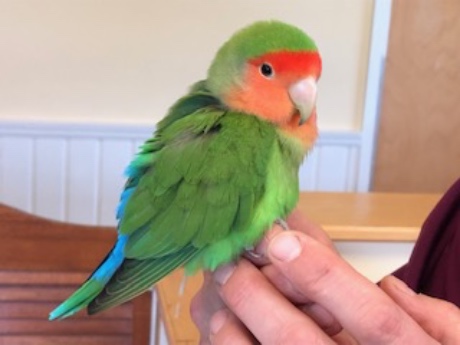
This colorful cutie landed on the person of reader Karen Laney while she was outside gardening today.
She lives on State Street Road in Batavia. Laney said the friendly avian is "very obviously a hand-raised bird."
She would very much like to find the owner of this affectionate pet and hopes the owner will contact her via email and make arrangements to reunite with it.
Her email is nclaneys@gmail.com
UPDATE 12:04 p.m., Friday, May 24: Karen Laney, whom the bird landed on, sent us this good news a minute ago: "A person who knew the owner saw the post about the bird in the Batavian and bird and owner have been reunited! Thanks so much for getting the word out!" You are welcome. We are glad!
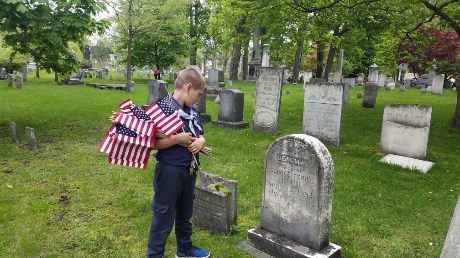
Submitted photos and press release:
Boy Scouts from Troop 6069 with the help of some of the Cub Scouts from Pack 6069, placed flags in front of the headstones of veterans at the Batavia Cemetery on Wednesday, May 22nd.
There were 16 scouts and eight leaders in attendance. The Troop has been working with the Historic Batavia Cemetery Association for the past several years on this project. It is a pleasure for the Scout Troop to provide this service to their community.
This was the first time that the Cub Scouts have been invited by Troop 6069 to help them with this community service project.
Assistant Scoutmaster Brown made sure to take the Cub Scouts to the grave site of Samuel Wood who is buried there. Wood is the namesake of Iroquois Trail Council's Cub Scout Resident Camp located in Pike. He was the first Eagle Scout recorded in Genesee County.
Boy Scout Troop 6069 is chartered through the First Presbyterian Church in Batavia, and it meets at Jackson Primary School.
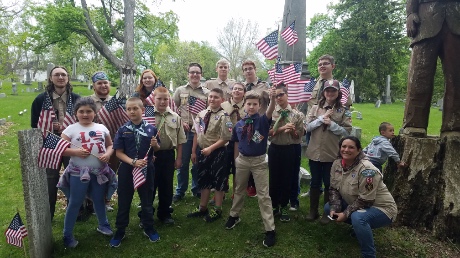
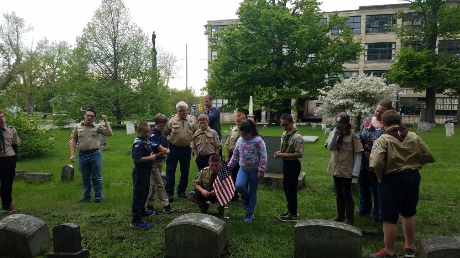
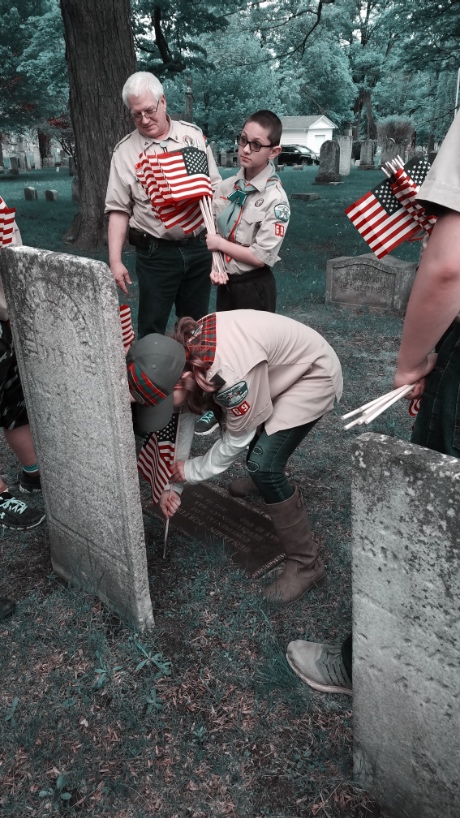
Eli Fish Brewing Company in Downtown Batavia hosted a Farm-to-Pint "Tap Takeover" on behalf of the Buffalo Niagara Brewers Association on Sunday.
By chance and circumstance, I've been spending a lot of time at Eli Fish recently, and it was a Sunday, so I thought I'd have a little fun with the video. I shot the video entirely hand-held (no stabilizer or tripod), with a 50-year-old 50mm lens, so only manual focus, using a shotgun mic I'd never used before. It was, indeed, fun experimentation and practice. And it was a fun event.
For brewers here to check out this video, you might also like to see Episode #2 of Batavia's Best Businesses, Eli Fish Brewing.
Benjamin Santiago Jr., 30, of Jackson Street, Batavia, is charged with petit larceny. After a larceny investigation at Crocker's Ace Hardware in Le Roy, Santiago was arrested May 18 for allegedly stealing $800 worth of tools from the store at 3:25 p.m. on May 14. He was released on an appearance ticket and is due in Le Roy Town Court on June 13. The case was handled by Genesee County Sheriff's Deputy James Stack.
Heather Nicole Holbrook, 34, of Byron-Holley Road, Byron, is charged with: criminal possession of a controlled substance in the seventh degree; endangering the welfare of a child; aggravated unlicensed operation in the third degree; and having an indequate muffler. At 10:08 p.m. on May 16, deputies conducted a traffic stop at the intersection of West Main Street and River Street in the City of Batavia. Following an investigation, Holbrook was arrested. She is accused of operating a motor vehicle while her driver's license was suspended and while in possession of a controlled substance, with two children as passengers. She was issued appearance tickets and is due in Batavia City Court on May 29. The case was handled by Genesee County Sheriff's Deputy Erik Andre, assisted by Deputy Robert Henning.
Heather Nicole Holbrook, 34, of Byron-Holley Road, Byron, is charged with failure to appear. She was arrested on a warrant out of Batavia City Court and arraigned at 10:58 a.m. on May 17. She is accused of failing to appear in Batavia City Court on May 9. She was released on her own recognizance and is to return to city court on May 29. The case was handled by Batavia Police Officer Peter Flanagan.
Michael David Senay Jr., 25, of Overlook Drive, Batavia, is charged with: third-degree menacing; fourth-degree criminal mischief; criminal obstruction of breathing; unlawful imprisonment in the second degree; and second-degree harassment. At 9 p.m. on May 17, following the investigation of a domestic incident in the Town of Batavia, Senay was arrested. He was arraigned in Batavia Town Court. He is due back in court on June 11. The case was handled by Genesee County Sheriff's Deputy Joshua Brabon.
Lee Christopher Clark, 39, of 8202 Lewiston Road, upper, Batavia, is a convicted sex offender charged with failure to report a change of address/status within 10 days as required. It is alleged that Clark failed to register Internet accounts with the NYS Division of Criminal Justice Services within 10 days. He was transported to the GC Sheriff's Office for processing and released on an appearance ticket returnable to Batavia Town Court on June 4. The case was handled by GC Sheriff's Deputy Travis DeMuth.
Sara Tea Cupler, 26, of Starr Road, Pavilion, is charged with criminal possession of a controlled substance in the seventh degree and unlawful possession of marijuana. Cupler was arrested at 8:33 p.m. on May 18 after a call to the Emergency Dispatch Center for a welfare check on a female unconscious in a vehicle on South Lake Road, Pavilion. Cupler was released on an appearance ticket and is due in Pavilion Town Court on June 4. The case was handled by Genesee County Sheriff's Deputy David Moore, assisted by Deputy Andrew Hale.
Robert G. Whitehead, 28, of Ellsworth Avenue, Batavia, was arrested on a bench warrant out of Batavia City Court on May 13. He is accused of failure to appear in court on Sept. 13, 2012. He was arraigned at 1:54 p.m. and then put in jail in lieu of $1,000 cash bail or $2,000 bond. He was due back in city court on May 16. The case was handled by Batavia Police Officer Miah Stevens, assisted by Officer Marc Lawrence.
Katrina Lynn Drake, 29, of Locust Avenue, Lockport, was arrested on May 21 and charged with trespass. It is alleged that at 5:39 p.m. on May 9 there was a disturbance on Tracy Avenue in Batavia and Drake allegedly went onto a porch and kicked a door. She is due in Batavia City Court on May 21 to answer the charge. The case was handled by Batavia Police Officer Christopher Lindsay, assisted by Officer Felicia DeGroot.
Bryan Jose Alvarado-Arce, 22, of Studley Street, Rochester, is charged with unlawful possession of marijuana. Alvarado-Arce was arrested at 6:29 p.m. on May 17 after a traffic stop on Townline Road in Bergen. He was a passenger in the vehicle. He was released on an appearance ticket and he is due in Bergen Town Court on June 5. The case was handled by Genesee County Sheriff's Deputy James Stack.
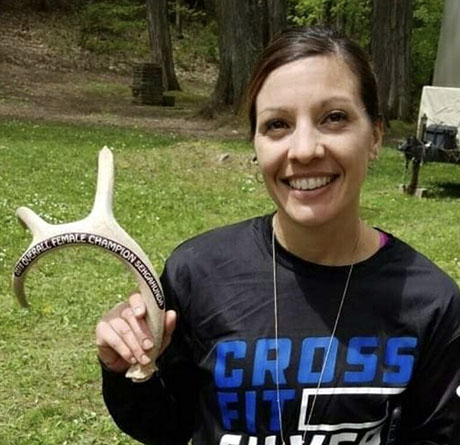
Submitted Write-up and photos
This past weekend hundreds of runners, with a large contingent from Genesee County, took part in the 10th annual Sehgahunda Trail Marathon at Letchworth State Park.
The course, which is comprised of 26.3 miles, starts at the Mount Morris Dam Visitor Center, and runs along the Finger Lakes Trail, ending in Portageville. There are between 3,000 and 4,000 feet of climbing and has been described as one of the hardest trail marathons on the East Coast. The race is organized by YellowJacket Racing of Rochester.
The wet spring made this year’s course extremely muddy and much more difficult. Three years ago, the race was extended to a two-day event, with the second day being comprised of an additional 5K, 10K, and 15K. For those who dare to attempt to complete both days and succeed, they complete a grueling 72 kilometers in two days, known as the “Sehgahunda 72."
Miranda Betances (top photo) of Batavia was the first female to cross the finish line on Saturday, completing the Trail Marathon in 4:51:19.
Chad Minuto and Stephen Konieczny, of Batavia, were two of 26 competitors who successfully finished both days of racing, becoming Sehgahunda 72ers.
Gabriel Abdella, of Batavia, who was diagnosed with brain cancer last year, successfully completed the trail marathon on Saturday in a time of 6:48:43, and also completed the 15K (9.3 miles) on Sunday. Abdella is an Adirondack 46er, and he and his wife, Michelle, recently hiked Mount Kilimanjaro in Tanzania, Africa.
Full results and more information about the race can be found at yellowjacketracing.com.
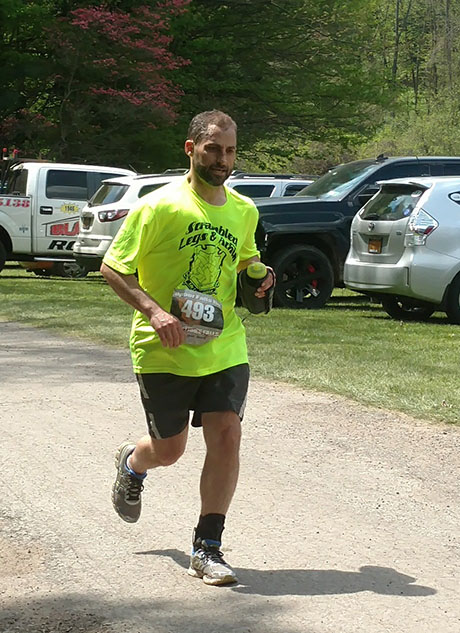
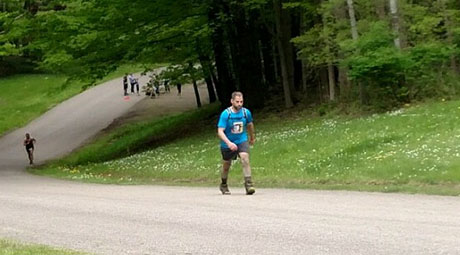
This photo and one above it, Gabriel Abdella.
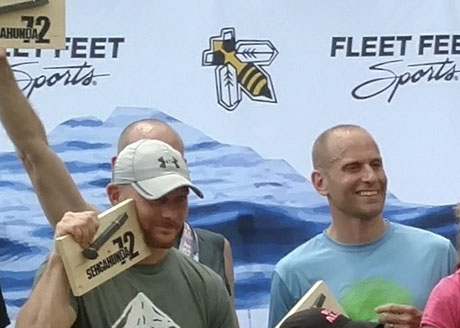
Stephen Koneiczny & Chad Minuto
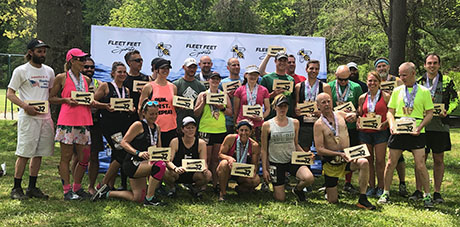
Finishers of Sehgahunda 72
Margaret R. Cecere, of Batavia, is among more than 1,750 students named to the Spring 2019 dean's list at Kutztown University.
To be eligible for the dean's list, an undergraduate student must be registered for at least 12 credits and have a minimum grade-point average of 3.60.
About Kutztown University of Pennsylvania
Founded in 1866, Kutztown University of Pennsylvania is a proud member of the Pennsylvania State System of Higher Education located on 289 acres nestled in the beautiful East Penn Valley in Berks County, between Reading and Allentown, Pa. KU is just two hours from New York City; 90 minutes from Philadelphia.
As the region's center for excellence in academics, culture and public engagement, KU's programs and reputation for quality offer students the opportunity to discover lifelong avenues of learning and discovery. KU students select from more than 100 areas of study within four colleges in a diverse liberal arts academic environment.
To complement their studies, KU's NCAA Division II athletics program with 21 varsity sports joins the more than 160 student clubs and organizations providing students with a variety of activities for learning and discovery.
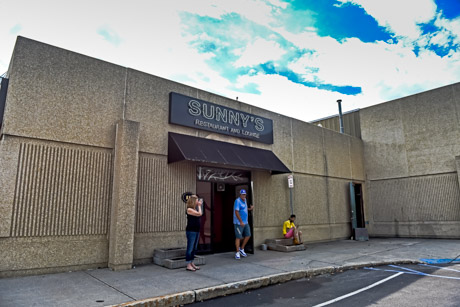
Sunny's in Batavia is closing its doors for the last time tonight.
Late this afternoon, Skinny Rose wasn't at the restaurant and Tiny Rose declined to comment about the closing.
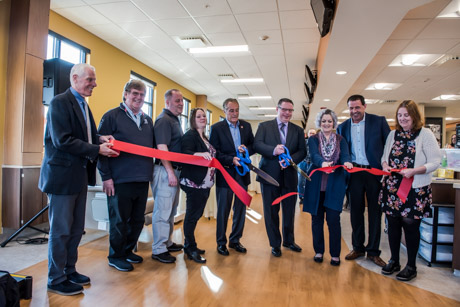
Local officials, including Rep. Chris Collins, were on hand Friday for an open house and ribbon cutting at Batavia's newest medical clinic, Fresenius Kidney Care, on Veterans Memorial Drive, just north of Home Depot.
The new facility will be staffed by 20 healthcare professionals and able to treat 102 patients per week.
It opens tomorrow.
Director of Operations Kenneth Crine said Fresenius came to Batavia because the current dialysis clinic is typically booked to capacity.
"I felt excitement for being able to provide needed dialysis services in a community that has a need for that," Crine said. "I think Batavia has been in that situation for a little while, where the current facility is kind of full and people have been displaced because of that, and being able to provide a center where people can have access to convenient healthcare is really important to me. So, you know, I feel good about that."
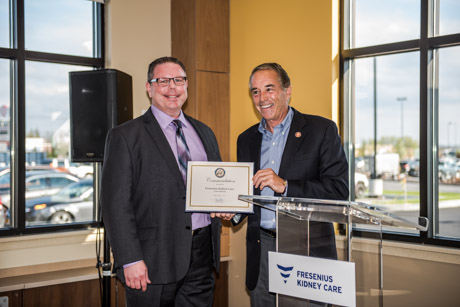
Kenneth Crine and Chris Collins
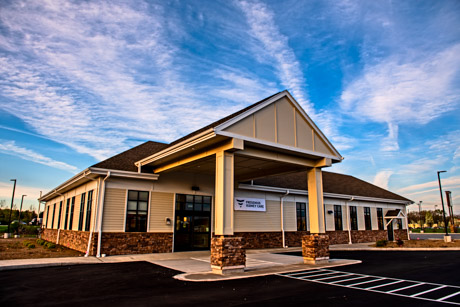
An invitation from Bob Bialkowski, Batavia City councilman at large:
This is an invitation to all members of the community to participate in this year’s Batavia Memorial Day parade on Memorial Day Monday May 27th.
The City of Batavia is sponsoring the parade and we are looking forward to another great turnout.
The parade will kick off at 9:45 a.m from the Eastown Plaza on East Main Street and end at the Alva Place parking lot downtown. People can then attend the Veterans Memorial Service at the Memorial site across the street at the Jerome Center.
Any veterans wishing to participate in the parade can just show up at 9:15. Veterans needing a ride in the parade please contact me.
Any groups wishing to participate please let us know as all are welcome. Please keep the theme of respect to all our veteran and first responders.
Let’s show our support to our veterans and first responders! Bring your lawn chairs and enjoy our annual parade.
Thank you,
Bob Bialkowski
585 409-3624
A one-vehicile accident with minor injuries is reported at Route 63 and Batavia Stafford Townloine Road. Town of Batavia Fire Department and Mercy medics are responding.
UPDATE 2 p.m.: A second ambulance is called to the scene and a first responder reports there are three patients.
UPDATE 2:06 p.m.: The second ambulance is cancelled; two patients are sign-offs.
UPDATE 2:21 p.m.: One person was transported to UMMC.
A caller reporters that two men are lying in the grass near Blondie's Sip 'n' Dip on East Main Street Road, Batavia, and they were hitting themselves.
Now they've stopped and are just lying in the grass.
A deputy has been dispatched.
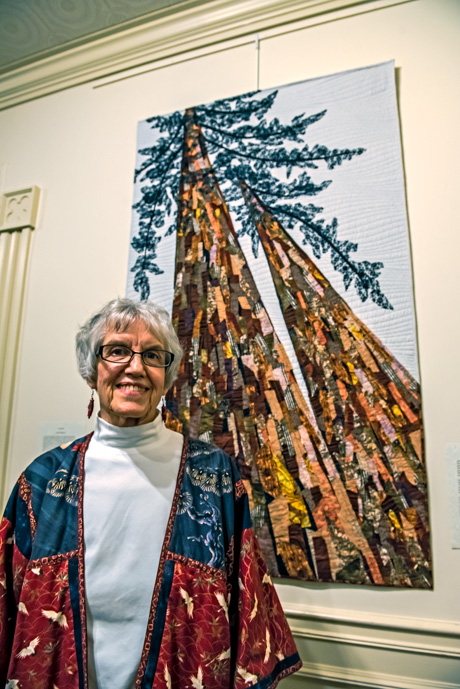
Janet Root opened her art show of fabric art Thursday night at GO ART! called "Innovations." The show runs through July 6 in the main gallery.
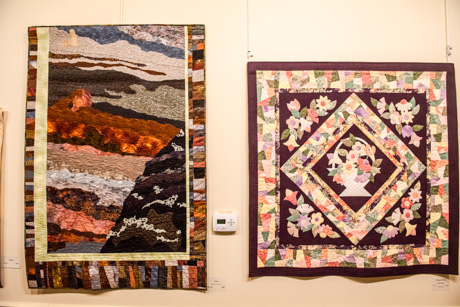
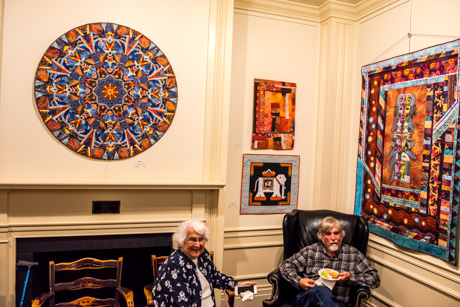
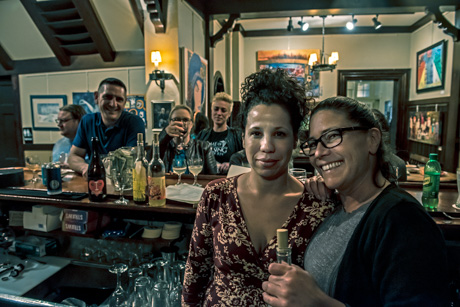
During the show openings, Thursday, Valerie Antonetty and Katie Elia served as guest bartenders with their tips benefitting GO ART!

A mixed-media show by Lydia Zwierzyanski and Megan Peters (not available for photos) also opened Thursday.
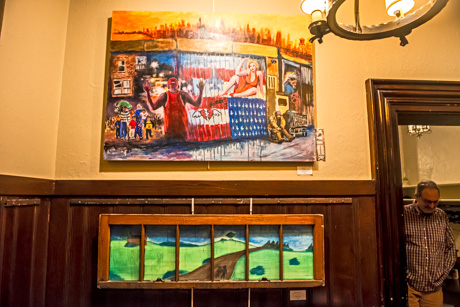
In the bar, there is now a member's art show on display, including work by David Burke (top painting).
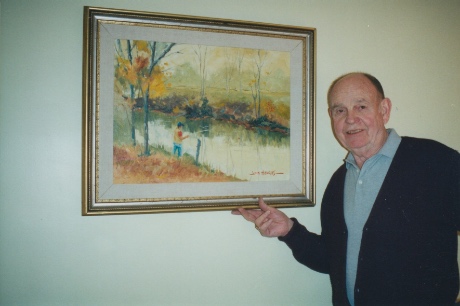
Photo of John Hodgins in February 2005 with an en plein air painting of his, courtesy of his daughter Joyce Dwyer.
Beloved local artist, Batavia businessman and former county legislator John Jay Hodgins died this morning. He was 87.
Born in Basom on Dec. 12, 1931 to Ora and Velma Hodgins, he grew up to become a printer, sign painter and entrepreneur who founded Batavia Press, Hodgins Printing, Hodgins Engraving, papersigns.com, and John’s Studio.
Hodgins also served his community -- eight years on the Batavia City Council and eight years on the Genesee County Legislature. He was a former member of the Oakfield Lions Club, a director at the Richmond Memorial Library, and a director of the Genesee County Baseball Club.
A longtime member of Batavia Society of Artists, he had been its treasurer and president, and had many shows of his work locally. He taught local students to paint and draw, and held art workshops in Maine and Florida. He authored and published four books, hiked most of the 2,200-mile Appalachian Trail, ran four marathons, and was a big fan of the Batavia Muckdogs baseball team.
He is survived by his wife of 67 years Mary T. (Paul) Hodgins, six children, 13 grandchildren and 13 great-grandchildren.
As a young man, Hodgins supported his family by delivering milk and baked goods, then he went to work in the printing business, starting as a compositor.
He worked at the Orleans Republican-American, Medina Daily Journal and the Buffalo Evening News before launching his own small printing operation from his barn in Basom in 1957. An initial investment of $500 bought a hand-operated letterpress, a few cabinets of lead type and a manual paper cutter.
The nascent business was moved to Batavia in 1961 and husband and wife worked side by side to grow it. Batavia Press, located at 30 Seaver Place, thrived and in 1971 an offer was made to buy it and the Hodgins accepted the offer. They subsequently started Hodgins Printing and sold only by mail order to out-of-town customers.
But within a year, the new owners of the Batavia Press failed and Hodgins Printing returned to serving the business community in Genesee County. In 1983, son Robert Hodgins started Hodgins Engraving, a printing die-making service for printers nationwide.
To meet the need for a local commercial printer serving Western New York, Batavia Press was reestablished. The family's second and third generation now manages the operations of: Hodgins Printing Co. and John's Studio -- in the Harvester Center -- and Batavia Press and Hodgins Engraving on West Main Street. There is also an online company, papersigns.com
John Hodgins retired in 1985.
Beyond his success as an ambitious businessman, John was a lifelong lover of all things art. He produced a prodigious amount of distinctive, unique and colorful creations.
His interest in drawing was first piqued in elementary school when his fifth-grade teacher asked him to draw a knight on a horse.
When John moved to Batavia, he became acquainted with the masterful Roy Mason, a nature-loving watercolorist known for his sporting and wildlife landscapes. Years later, he spent three summers in Maine under the tutelage of famed watercolorist Edgar A. Whitney, best known for his coastline art.
In the mid-1980s, John and fellow Batavia artist Don Grieger started painting en plein air, French for outdoors painting. The practice was not widely popular as it is today. In a kind of spoof of a Canadian group of plein air painters in the early 20th century called "The Group of Seven," the duo called themselves "The Group of Two."
Inevitably, more artists came along and thus "The All Weather Gang" was born. They still get together some Saturday mornings for breakfast at a local diner before heading out to paint scenic vistas, usually in Genesee, Wyoming or Livingston counties, irrespective of the clime. Among their favorites places to paint are creeks: the Tonawanda, the Little Tonawanda, and Oatka.
"You get the feel of the place more when you're outdoors," Grieger said, "rather than painting from a photograph."
Just as he was mentored by quality artists, Hodgins was a mentor to young people.
Among those who learned a thing or two from him is Mark Fanara, who took drawing and painting lessons from Hodgins as a second-grader. Fanara won awards for his art in high school and while studying at SUNY Brockport, where he earned a Bachelor of Fine Arts degree. He has been a tattooist since 2005 and opened High Voltage Tattoo in Batavia in 2006.
Another mentee is Batavia native Bill Mancuso, assistant professor of Art and chair of the Department of Art and Design at Ohio Northern University. He curated an exhibit last fall about the All Weather Gang at ONU's Elzay Gallery and wrote a book for the exhibit about the All Weather Gang and its members past and present.
Mancuso is working on a biography/retrospective about John Hodgins.
"I wouldn't be doing what I'm doing today without John Hodgins and Don Grieger," Mancuso said. "John was generous. He lived a big, full life. ... John painted ordinary things and made them extraordinary -- Gardner's Barn, the Pok-A-Dot. He saw beauty in everyday things, the way they really are; not like scary museum Art with a capital A."
His appreciation for the unpretentiousness of small-town life was writ large.
Asked about his inspirations for artwork, Hodgins once said he tried to be original and do something different, regardless of the medium he chose. He could be inspired by something as mundane as sneakers, as common as milkweed, and as mythical as flying pigs. He put his special imprimatur on them all.
For John Hodgins full obituary, click here.
(Below is a file photo of John Hodgins' "News Stand" which The Batavian acquired in December of 2009.)
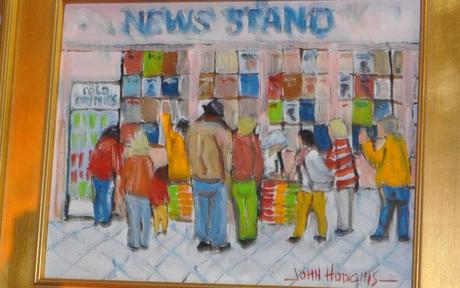
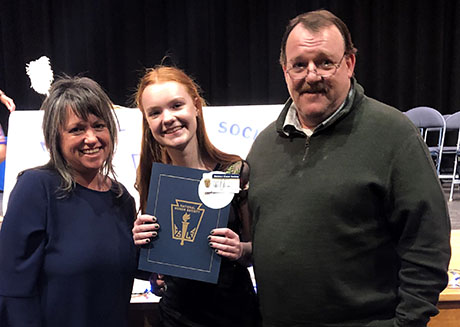
Photo of Tate Fonda with her parents, Tina and Dwayne Fonda Sr.
Submitted photo and press release:
BATAVIA -- Tate Fonda, a sophomore at Batavia High School, will be a Delegate to the Congress of Future Medical Leaders in Lowell, Mass., June 23-25.
The Congress is an honors-only program for high school students who want to become physicians or go into medical research fields.
The purpose of this event is to honor, inspire, motivate and direct the top students in the country who aspire to be physicians or medical scientists, to stay true to their dream and, after the event, to provide a path, plan and resources to help them reach their goal.
Tate's nomination letter was signed by Dr. Mario Capecchi, winner of the Nobel Prize in Medicine and the Science Director of the National Academy of Future Physicians and Medical Scientists. Tate will represent Batavia High School based on her academic achievement, leadership potential and determination to serve humanity in the field of medicine.
During the three-day Congress, Tate will join students from across the country and hear Nobel laureates and National Medal of Science winners talk about leading medical research; be given advice from Ivy League and top medical school deans on what to expect in medical school; witness stories told by patients who are living medical miracles; be inspired by fellow teen medical science prodigies; and learn about cutting-edge advances and the future in medicine and medical technology.
“This is a crucial time in America when we need more doctors and medical scientists who are even better prepared for a future that is changing exponentially,” said Richard Rossi, founder, National Academy of Future Physicians and Medical Scientists. “Focused, bright and determined students like Tate Fonda are our future and she deserves all the mentoring and guidance we can give her.”
The Academy offers free services and programs to students who want to be physicians or go into medical science. Some of the services and programs the Academy offers are: online social networks through which future doctors and medical scientists can communicate; opportunities for students to be guided and mentored by physicians and medical students; and communications for parents and students on college acceptance and finances, skills acquisition, internships, career guidance, and much more.
The National Academy of Future Physicians and Medical Scientists was founded on the belief that we must identify prospective medical talent at the earliest possible age and help these students acquire the necessary experience and skills to take them to the doorstep of this vital career.
Based in Washington, D.C., and with offices in Boston, the Academy was chartered as a nonpartisan, taxpaying institution to help address the need for more physicians and medical scientists by working to identify, encourage and mentor students who wish to devote their lives to the service of humanity in these careers.
For more information visit www.FutureDocs.com or call 617-307-7425.
Copyright © 2008-2022 The Batavian. All Rights Reserved. Privacy Policy | Terms of Service